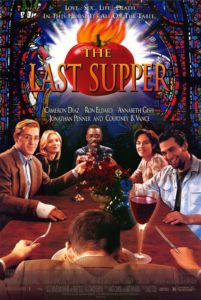The Last Supper
Posted By Beau Albrecht On In North American New Right | Comments DisabledThe Last Supper came out in 1995, back when films tended to be a lot more watchable. It’s is about five Leftist grad students sharing a house. They enjoy bull sessions; you know the type. Early on, we have the opening premise: “It’s 1909 and you’re alone with a young artist named Adolf. Do you kill him?” (I’m not so sure that would have kept the peace, but that’s another matter [2]. Either way, in any discussion of situational ethics, this scenario can be used as a ready-made trump card.) That, of course, leads into a debate. Soon, they’re putting their principles into action.
The plot
It was a dark and stormy night. One of the housemates has a breakdown on the road, and someone tows him back. That guy came right from the department of Central Casting specializing in scary rednecks with green teeth, although he’s quiet and polite at first. They invite him to stay for supper. They’d been expecting someone for a weekly discussion, but he couldn’t make it.
After getting him loosened up, it turns out that he is a veteran with dreadfully provincial beliefs. Then he even goes so far as to praise Hitler. (Of course, that’s a dead giveaway that shit’s about to get real.) The straw-man Rightist is also dumb as a brick, not knowing what a Master’s degree is. It turns out later that he’s committed a loathsome crime. Way subtle! He challenges them:
Scary Redneck: You Left-wingers make me wanna puke. You never take a real stand. A stand that you’d be willing to —
Heroic Jew: Die for?
Scary Redneck: No, boy. Dying’s easy. Ain’t nothing heroic about dying. But if you can take a stand for something you’d kill for, that’s something. Something special.
After some verbal sparring, the knives come out, to put things briefly. (Oh, sure; how common is it for a fight to break out over dinner? Well, I suppose it happens [3].) The Heroic Jew wins, naturally.
So now they have a different problem. Before, they had a scary redneck with green teeth threatening to carve them up. Now, they have a scary redneck with green teeth with a knife in his back and approaching room temperature. What next? What are they going to tell the cops? The Pragmatic Black convinces the rest that the most expedient thing to do is put him in a backyard grave, ditch his pickup elsewhere, and go on with their lives as if it never happened. In brief, “I say we bury the cracker and have dessert.”
Emboldened with their success, they decide to repurpose their weekly discussions and stage a repeat performance. The first special guest invited to his last supper is Reverend Gerald Hutchens. At first he seems quite affable, but then he begins trash-talking gays. For example: “Homosexuality is the terrible disease and AIDS is the cure.” That much is beyond the pale, of course, no matter how appreciative he is of their cooking. They serve him from a blue decanter of poisoned wine. It works, and is quickly fatal. (This was likely a lot faster-acting, and less painful, than a lethal dose of arsenic really would be.) Premeditated murder turns out to be possible in a jiff!
Other guests follow later. Each of these potential Hitlers is served up a meal with a big helping of liberal tolerance for dessert. Those condemned for provincial views include — as named in the credits –Dominant Male, [Anti-]Abortion Activist, Nation [of Islam] Man, Homeless Basher, Illegal Alien Hater, The Anti-Environmentalist, Skin Head, and Illiterate Librarian.
The last was a particularly harsh case. She was a non-drinker, so she got knifed in the back. Her crime wasn’t illiteracy, but rather it was for disliking Catcher in the Rye. Being perceived as an unhip philistine seems a poor reason to whack someone. At the very least, it’s hard to say that she’s literally Hitler — but, well, yanno [4], these are Leftists we’re talking about here. Their notable aversion to the death penalty doesn’t extend to people who disagree with them. Moreover, she was right: Catcher In the Rye objectively sucks raw Rocky Mountain oysters [5].[1] [6]
At first, it’s all fun and games to these serial killers for social justice. In one case, they mock the dying guest. Murder aggravated by bad taste is hardly the picture of their famously supersized bleeding hearts. However, as we all know liberal compassion tends to be pretty selective. They bury each illiberal corpse in the back yard, disguising the resulting mounds as tomato beds. That seems to work out fairly well, though the extra arsenic in the veggies might turn out to be a problem.
 [7]
[7]You can buy Trevor Lynch’s Classics of Right-Wing Cinema here [8].
When their body count reaches ten, some of the housemates start getting cold feet. One of them plants flowers around the tomato beds, showing some belated respect for the dead. (Later, the Pragmatic Black removes them, since the adornment seems too obvious.) At the next supper they decide to spare the guest. She’s a teenager who finds mandatory sex education at school to be morally objectionable. At last, this is a transgression that doesn’t merit the death penalty. Luckily for her, she never says anything bad about Catcher in the Rye!
At that point, the housemates might’ve been inclined to pull themselves out of the abyss – but it’s then that things start spiraling out of control. This is bound to happen after ten unexplained disappearances within about three months. This would likely be merely a statistical uptick on a data point if this took place in Chicago, but that sort of thing will be noticed in a tranquil college town in Iowa.
Then a couple of them have a chance meeting with Norman Arbuthnot, a conservative TV commentator approximately based on Rush Limbaugh [9]. (He’s played by Ron Perlman, looking here somewhat like a Scotsman/Neanderthal hybrid.) They’ve had a hate-on for him from the beginning, so as one last hurrah before vacation, they invite him over for supper. This, of course, sets the stage for the conclusion. Whether it’s tragic or deserved will depend on the viewer’s ideological perspective.
Summary
This was sort of a Russian novel written as a black comedy and then compressed into an hour-and-a-half of cinema. Although it’s told from a Leftist perspective — what else can one expect from Hollyweird? — they ended up subverting their message by taking it a little too far. The bad guys are rather brutally caricatured, but there’s no sting in it. Arbuthnot is the only one with any subtlety; the others all get the straw-man treatment, and it’s hard to take that personally.
As for the good guys, the movie is a lot more truthful. Although they’re depicted sympathetically, it’s pretty hard to find them particularly admirable. They would’ve done well to remember Nietzsche’s famous warning:
He who fights with monsters should look to it that he himself does not become a monster. And if you gaze long into an abyss, the abyss also gazes into you.
They become serial killers; that kinda sorta puts them in bad guy territory, now doesn’t it? Some among this secret combination do develop second thoughts, at least to the point that the group has trouble reaching a consensus — but it took nine dead bodies for any of these zealots to figure it out. (I’m only counting the premeditated murders; the first was legitimate self-defense.) That’s quite a while to get a clue that an action’s morality does not depend on the participants’ ideology or opinions.
Granted, up to that point the housemates conduct a lot of pious discussion about right and wrong. (I’ll have to hand it to the filmmakers: the bull sessions were spot-on.) Still, as usual for good Leftists, they always spin their fuzzy situational ethics until they find the wiggle room to justify doing whatever it is they want. This includes taking it upon themselves to assassinate those outside of their ideological bubble.
It’s hardly just a theoretical discussion. There are plenty of smug, self-righteous Leftists in real life who’d do exactly that, if they could get away with it. They think they’re justified to do anything they want to advance their cause. The problem for them is that their behavior sets a certain precedent. Of course, they’re the same sort of crybullies who’d get shocked and offended, squealing about their sacred rights, if someone gave them back even a fraction of their own dirty tricks. It’s hardly unheard of in history for the Leftists to push things to the edge of disaster, until the Rightists finally get sick of playing Mister Nice Guy.
All things considered, I’ll rate the film three out of five helicopters.
* * *
Like all journals of dissident ideas, Counter-Currents depends on the support of readers like you. Help us compete with the censors of the Left and the violent accelerationists of the Right with a donation today. (The easiest way to help is with an e-check donation. All you need is your checkbook.)
For other ways to donate, click here [10].
Note
[1] [11] Granted, artistic works mean different things to different people, so surely there are others who got something more out of Catcher in the Rye than I did. (Mark David Chapman was one of them, but that’s another story.) Sure, go ahead and read this classic work of literature, if you want. I suppose it’s not so bad for a story about a sophomoric mope whose silver spoon in his mouth starts to get rusty after flunking out of three prep schools, is experiencing a midlife crisis at the age of 17 going on 12, and who preoccupies himself with building castles in the sky whenever he’s not making an ass of himself – besides which the misunderstood hero can’t stop blathering about everything being phony. Did I mention that it sucks?
